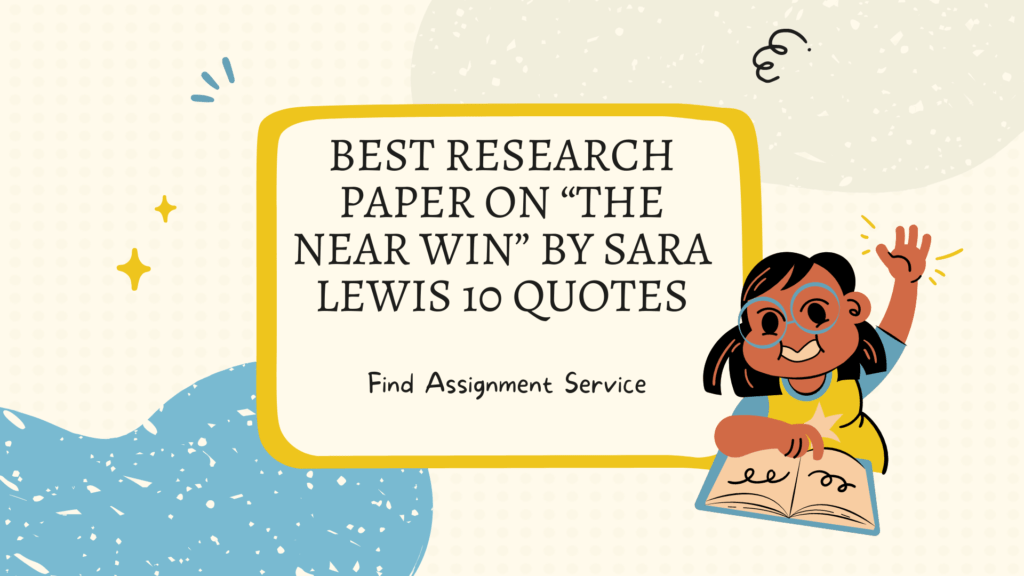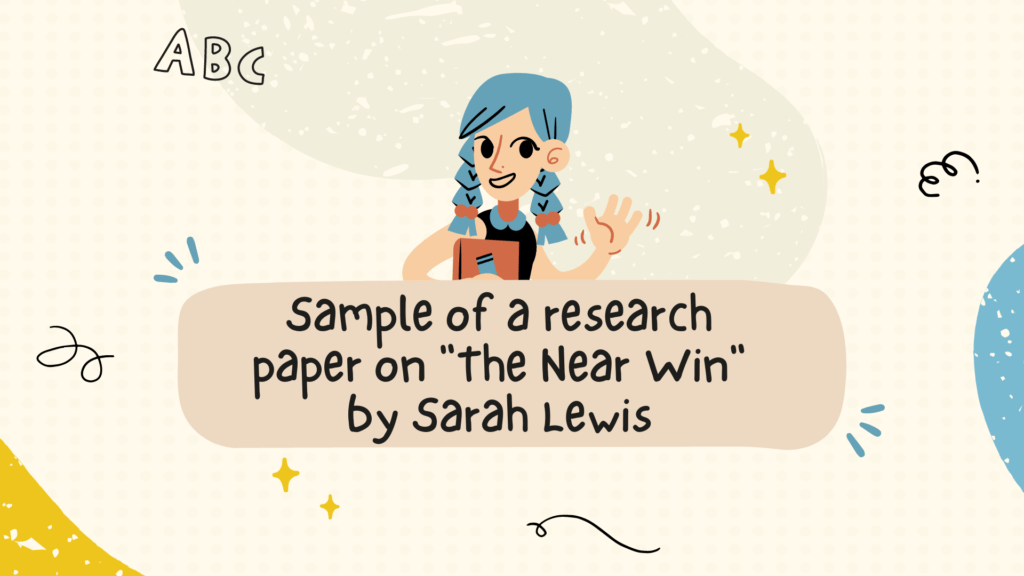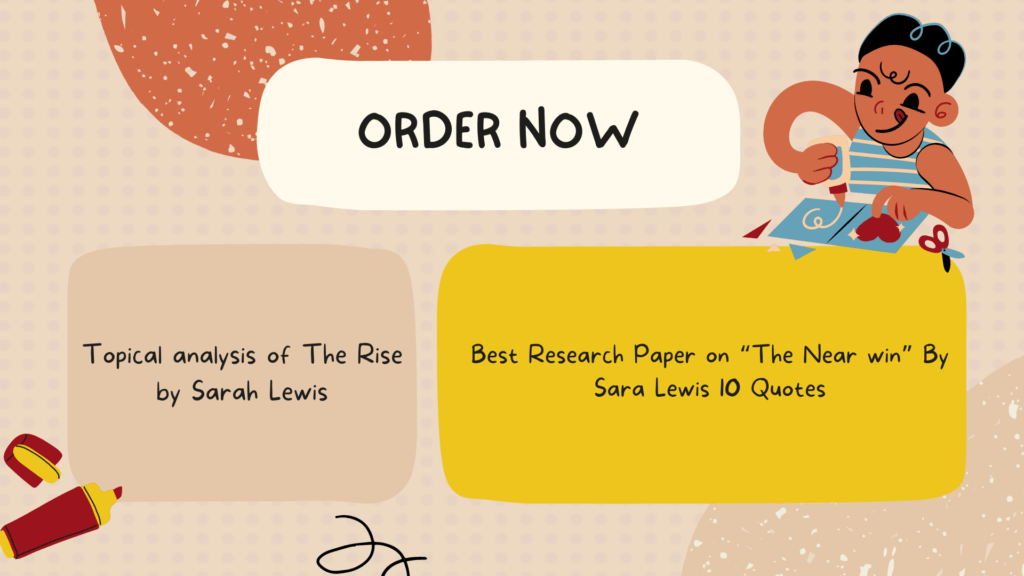Posted: January 5th, 2022
Best Research Paper on “The Near Win” by Sarah Lewis

The Near Win by Sara Lewis Sample Paper
Sarah Lewis addresses the theme of “near win” as constructive to excelling in ‘The Rise,’ one of her fascinating books about the pursuit for mastery. The focus of this subject is to motivate towards our success. It propels us to keep rising in our quests. This is what “The rise” is all about. We find the strength to try though we fail, but with the mind of closeness to winning, we go beyond our capabilities. This is what makes life beautiful and hopeful. “Near win” is mastery that brings a breakthrough when we seem to have given up. Lewis say:
The Near Win
A near win shifts our view of the landscape. It can turn future goals, which we tend to envision at a distance, into more proximate events. We consider temporal distance as we do the spatial distance. (Visualize a great day tomorrow, and we see it with granular, practical clarity. But picture what a great day in the future might be like, not tomorrow but fifty years from now, and the image will be hazier.) The near win changes our focus to consider how we plan to attain what lies in our sights but is out of reach (Sarah Lewis).
Mastery is one of the most perplexing aspects of human nature. Sarah admonishes people to embrace “near win” as a critical theme in the book “The Rise,” which addresses failure entirely. The article “The Cry-Eyed Pianist” describes the England team’s loss in the 2018 World Cup to Croatia in the semifinals. It was hard for them to accept the failure, but they never saw that landing in the top four was an achievement.
The loss against Croatia should have given the coach an idea of developing his team to win in the 2022 world cup. The path to mastery is laid with hardships, but if we are willing to accept them, they make room for more effort, success, and accomplishment of objectives. Sarah says that success gives us motivation, but “near-win” propels us to our quests. It brings a mindset of growth.
In the talk “Embrace the near win,” Sarah challenges us to consider the importance of “near win” in our lives. She says that what makes us keep moving and more potent is the power of mastery, valuing the “near win.” Near-win factors are correlated to a gambling habit and have a strong influence on addictive behaviors. There is a scarcity of information on the character traits that establish vulnerability to a near-win outcome.
The prize of failings is a puzzle. It is always that both emptiness and the beginning of infinitude, just like the number zero. The Rise, part exploration into a mental wonder, part reasoning regarding creative thinking and craft, and portion heartfelt festivities of the human soul’s fortitude, argues that understanding the significance of this mystery has led to so many of our crowning accomplishments.

Sarah Lewis illustrates the theme of “near win” using several stories. One of them is the story of silver and a bronze medalist who participated in the Olympics in 1992. From an interview by psychology professor Thomas Gilovich, the research team gave their response to the participants. The medalists had different answers on their positions. The silver medalists were more frustrated than the bronze medalists. Such disappointment made the silver medalists have the motivation and focus and were driven to achieve what they missed in their competition.
The case was not the same with the bronze medalists who showed some satisfaction with the medal they held. The “near win” was the motivation point. The same case applied to Jackie Joyner, who participated in the Olympics of 1984. She became third in the completion, which made her lose the gold medal. The coach knew that this defeat would make her succeed in the next Olympics. In 1988, she set the record in the heptathlon competition. The “near win” is all around, in gambling, business, sports, etc.
In politics, Al Gore, the former vice president, expressed the fascinating types of “near win” to win the presidency. He was focused until the court told him that it was not his time to get the victory. The fact motivated him primarily. “Success is going from failure to failure with no loss of enthusiasm,” said Sarah. This is the power of mastery which she describes as:
Mastery requires endurance. Mastery, a word we don’t use often, is not the equivalent of what we might consider its cognate—perfectionism —an inhuman aim motivated by a concern with how others view us. Mastery is not the same as success—an event-based victory based on a peak point, a punctuated moment in time. Mastery is not merely a commitment to a goal, but to a curved line, constant pursuit (Sarah Lewis)
This study looked at the event-related potentials (ERPs) and behaviors of 27 realists and 25 skeptics after gambling results in a customized video poker betting task to see if realists are much more vulnerable to the near-win impacts than skeptics. The outcomes revealed that the average transients of the evaluated ERPs incited through near-win effects never distinguished between the idealist and skeptic teams; however, the groups displayed distinct behavior responses in the activity. Regarding near-wins, optimists certainly made risky bets, while pessimists seemed to be wary.
According to common sense and study, being able to win is more encouraging than missing. Nevertheless, we contend that simply failing to gain a remuneration, that is, the near win, in one activity has a broader, motivational effect on future unconnected activities than certainly missing or truly getting the remuneration. The study involved four experiments. The results showed that the near win task in experiment 1 motivated the participants to move faster to the bar of chocolate and yearned for a money prize in experiment 2.
They were later encouraged to grab the money in experiment 4 task of card sorting. A field research experiment 4 found that the “near win” caused participants to pay more money on appealing consumer goods. Ultimately, once the stimulated persuasive state was lessened in a mediating activity, the “near win” effect was reduced.
Individuals are usually so close to receiving a reward that they nearly win only to end up losing. Consider a winning bid that you were close to winning, a deal that you were close to closing, or a lottery number that you were so close to winning. Recent research focuses mainly on broader inspirational implications of such observations of well almost securing a recompense when such remuneration is won by chance.
According to rationality and study, failing to achieve rather than successfully receiving a remuneration is more likely to lessen people’s inspirational state. According to studies, Monica and Kim (701-708) report from a study by Eliot that individuals are inspired to approach prizes. As they attempt to reach an award, their ambition to receive it increases. The effect is known as the goal-gradient effect.
In their first and second experiments, Monica and Kim (701-708) demonstrated that being close to receiving a reward, as opposed to losing a reward, increased people’s interest in finding other unconnected but attractive results. Based on Depue and Collins’s previous findings, they hypothesized that an inspirational state influenced by a “near win” would increase the motivation to obtain unassociated specific modules but not limited to results.
They used a biological criterion in reaction to a reward in this study to test the generalization of the “near win” effect. According to studies by Gal, inspiration to receive compensation accelerates salivation in expectation of the recompense. As a result, they investigated whether “near win” could increase contestants’ salivation in reaction to an unconnected but desirable item.
One of their experiments tested the speed at which the participants would walk towards a desirable result after experiencing a near win and loss after drawing from research that motivation is measured by the speed at which one approaches the desirable outcome. Monica and Kim (701-708) hypothesized that “near win” would motivate a person to obtain unrelated, though desirable, reward. The results showed that participants who nearly won the recompense were majorly inspired to get the unconnected though desirable reward than the losers.
Somebody could assert that almost missing a prize lowered mood or increased arousal, causing contestants to move faster again for chocolate. Participants in the thin margin, neither situation should have walked quicker than those from the losing state if that was the scenario. In the following experiments, they tried to rule out mood and arousal-related explanations even further. One can also claim that individuals who came close to winning regarded the game as simpler than others who totally lost and were more likely to blame themselves for such loss.
Understanding what motivates behavior requires an understanding of motivation. According to research, the outcome, whether you win or lose, is a significant motivator. While winning can boost motivation, giving up can sap it. We proposed a new “near win” effect in which the almost winning increases desire on unrelated activities compared to losing or winning. In a variety of ways, we contributed to the “near win” effect. The first demonstrated that missing a reward in one game increased participants’ encouragement to walk faster to achieve another unrelated but attractive result.
Furthermore, the nearly-winning effect was reduced when the anticipation of the reward ended early. The third experiment demonstrated that when contrasted with winning or losses, “near win” in one activity motivated participants to work harder to earn cash in the following tasks. Furthermore, lessening inspiration in a mediating action reduced the “near win” effect. Study 4 demonstrated that this influence could be generalized to real-world behaviors.
According to Yuan (2018), “near win” is a type of failure related to success and is most evident in an entrepreneur’s investment. In his research, he investigated the impact of a near-win on investment amounts by utilizing an exceptional panel personal level lottery buying data set with above a hundred thousand players that track every one of their items purchased for several days. People who have had a near-win experience are more likely to participate in the FC3D raffle. It implies that a close win would encourage people to expand their capital investment.
“Near win” creates pressure within us which drives us to where we need to be or what we want to achieve. From the studies at different points, we are exposed to various fields and realize the power of this theme in daily life. The power that motivates athletes, politicians, and even people in business to go out of their comfort zone is not driven by success or achievement but that we are nearing the winning landing our dreams. It is a hope give a factor, a motivating factor towards our goals. Like Sarah Lewis says, “At the point of mastery, when there seems nothing left to move beyond, we find a way to move beyond ourselves.”

References
Lewis, Sarah. The rise: Creativity, the gift of failure, and the search for mastery. Simon and Schuster, 2014.
Xia, Jie, Daxing Wu, and Xin Xu. “Susceptibility to the gambling near-win effect in optimists versus pessimists: An event-related potential study.” Personality and Individual Differences 129 (2018): 159-165.
Wadhwa, Monica, and JeeHye Christine Kim. “Can a near win kindle motivation? The impact of nearly winning on motivation for unrelated rewards.” Psychological science 26.6 (2015): 701-708.
Yuan, Jia. “Does Near Win Affect People’s Investment Behavior?.” (2019).
Expert paper writers are just a few clicks away
Place an order in 3 easy steps. Takes less than 5 mins.
